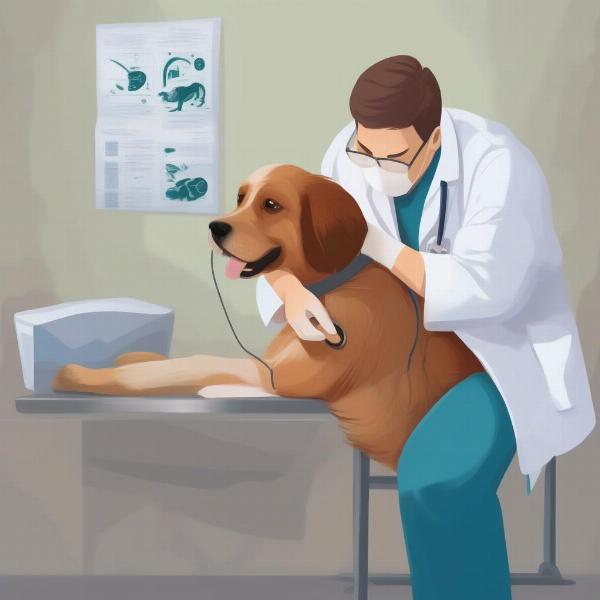Finding the best flea treatment for your dog in the UK can feel overwhelming with so many options available. This guide will help you navigate the choices, understand what to look for, and ultimately choose the best flea treatment to keep your furry friend happy and itch-free. We’ll cover everything from the different types of treatments to important factors to consider based on your dog’s individual needs.
Understanding Flea Treatments in the UK
Several types of flea treatments are available in the UK, each with its pros and cons. Common options include spot-on treatments, oral medications, flea collars, and sprays. Spot-on treatments are applied directly to your dog’s skin, usually on the back of the neck. Oral medications are ingested and work systemically. Flea collars release insecticide over time, and sprays offer immediate but shorter-term protection.
Understanding the active ingredients is crucial. Some common ingredients in UK flea treatments include fipronil, imidacloprid, selamectin, and fluralaner. Each ingredient works differently, targeting various stages of the flea lifecycle. Some kill adult fleas, while others prevent eggs and larvae from developing.
Choosing the Right Flea Treatment for Your Dog
Several factors will influence your choice of flea treatment. Your dog’s age, breed, size, and health condition all play a role. For example, some treatments are not suitable for puppies or pregnant dogs. If your dog has any underlying health issues, consult your vet before choosing a flea treatment.
Your lifestyle and environment are also important considerations. If your dog swims frequently, a waterproof treatment might be necessary. If you live in an area with a high flea infestation, a stronger or more frequent treatment might be required.
Best UK Flea Treatment for Dogs: Key Considerations
When choosing the best UK flea treatment for dogs, look for products licensed by the Veterinary Medicines Directorate (VMD). This ensures the product has met rigorous safety and efficacy standards. Always follow the instructions on the product label carefully.
 Vet Checking a Dog for Fleas
Vet Checking a Dog for Fleas
Consider the duration of protection. Some treatments last for a month, while others offer shorter-term coverage. Think about your dog’s individual needs and how often you’re willing to apply the treatment.
Preventing Future Infestations
While flea treatments are essential, prevention is equally important. Regular grooming, vacuuming your home, and washing your dog’s bedding can help reduce the risk of infestations. Consider using flea preventative products in your home, such as sprays or foggers, especially in areas where your dog spends a lot of time.
Conclusion: Keeping Your Dog Flea-Free
Choosing the best dog flea treatment UK requires careful consideration of your dog’s individual needs, lifestyle, and environment. By understanding the different types of treatments available and following the advice in this guide, you can keep your canine companion happy, healthy, and flea-free. Remember to always consult with your veterinarian if you have any concerns about your dog’s health or which flea treatment is best for them.
FAQ
- What is the most effective flea treatment for dogs in the UK? The most effective treatment will vary depending on individual factors, but products containing fluralaner are generally considered highly effective.
- How often should I treat my dog for fleas? Most treatments are applied monthly, but always follow the product label instructions.
- Can I use cat flea treatment on my dog? Never use cat flea treatment on a dog, as some ingredients can be toxic to dogs.
- What are the signs of a flea infestation? Excessive scratching, biting, hair loss, and small black specks (flea dirt) in the fur are common signs.
- Are there any natural flea remedies for dogs? While some natural remedies exist, they are often less effective than conventional treatments. Consult your vet before trying any natural remedies.
- What should I do if my dog has a flea allergy? Consult your veterinarian immediately for appropriate treatment and management.
- Can fleas transmit diseases to dogs? Yes, fleas can transmit diseases such as tapeworms and Bartonellosis.
About ILM Dog
ILM Dog (ILM Dog) is your trusted international source for comprehensive dog care information, specializing in breed selection, health, training, nutrition, grooming, and product recommendations. We offer practical advice to dog owners of all experience levels, from puppy care to senior dog support. Whether you’re looking for the best flea and tick treatment or advice on home remedies for common canine issues, we’re here to help. Contact us for personalized guidance at [email protected] or +44 20-3965-8624.